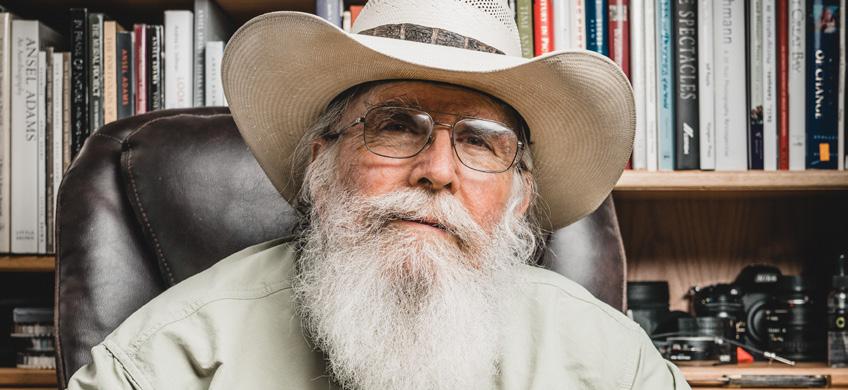
5 minute read
Rock Stars of the Environment
Clyde Butcher - World renowned environmental photographer
His focus on the Florida Everglades brought unprecedented appreciation to this unique, natural resource. After suffering a stroke, Butcher’s desire to get back out to continue to document its beauty has aided in both his physical and mental recovery.
William Watson – Certified Forest Therapist

He creates connections between people and nature by guiding them through multi-sensory exercises that help reset priorities, relieve stress, regain inner strength and rebuild a state of wellbeing.
Sylvia Earle - Oceanographer, research scientist and Time Magazine's first "Hero of the Planet"

She is the former Chief Scientist of the National Oceanographic and Atmospheric Administration (NOAA), and author of over 180 publications about marine science and technology. Earle has led over 100 expeditions, logging more than 7,000 hours underwater. Still active as a National Geographic Explorer in Residence at the age of 88, she has received more than 100 national and international honors.
Jill Heinerth – Underwater explorer, writer, filmmaker

She quit an office job to become an underwater cave diver. Heinerth is the first person to explore the ice caves of Antarctica, going further into an underwater cave system than any woman in history.
Dr. John Francis – Conservationist, educator

Inspired by a large oil spill in San Francisco Bay he took a vow of silence and walked across the country to raise awareness. A goodwill ambassador for the UN Environment Program, Francis is the author of “Planetwalker: How to Change Your World One Step at a Time.”
Jennie Romer – Sustainability expert, lawyer, author

She is an unsung American hero who has stepped into the fight to encourage recycling. Romer has been at the forefront of creating meaningful legislation to enact recycling and she travels the country giving lectures and interviews to offer a real understanding of how recycling actually works. Her book is called, “Can I Recycle This? A Guide to Better Recycling.”
5 Ways You Can Be a Rock Star of the Environment
We are the first generation to realize the toll our waste is taking on our planet. We will be judged by what we do about it. Something we can all do is talk about it. Talk to your family, friends and neighbors about protecting the earth. Let them know this is important to you. Talk about ways all of us can make a difference. Speak up and make your voice heard.
Use Your Mind
The more you know the better you'll understand the importance of being part of the solution and limiting your contributions to the problem. Knowing the latest information and statistics will help you have thoughtful, impactful conversations with friends and family and the people you want to influence. Stay up to date with recent news on the state of our natural world and keep an eye out for ways you can help.
Eat Sustainably
Between farm and fork, food must be processed, packaged, transported, marketed and sold. Sustainable agriculture uses up to 56 percent less energy and 64 percent fewer greenhouse gas emissions. Choose sustainably farmed whole foods over intensively farmed and highly processed food products when you can. Do your research about where foods come from and how they are produced.
Buy Less
Buying less will save you money, reduce waste and shrink your environmental footprint. Use your purchasing power to spend on things that support positive change which will encourage companies to source and produce products in a more sustainable way.
Volunteer
By volunteering for things that protect the environment, you can make a positive impact on the planet and your health, social life, and more. You can volunteer to:
Ɂ Plant trees
Ɂ Pick up trash
Ɂ Help at area parks
Ɂ Seek outreach programs on conservation and wildlife
Ɂ Help maintain your neighborhood and community
Do You Recycle?
While everyone seems to be in favor of recycling, apparently, not enough people are doing it. According to the Environmental Protection Agency, only 32 percent of recyclable trash ever makes its way to a recycling center, leaving the rest to be dumped in landfills. Here are some facts that underscore why it is worth the extra effort for us all to recycle.
Ɂ The average person has the opportunity to recycle more than 25,000 cans in a lifetime.
Ɂ Recycling just one aluminum can saves enough energy to power a TV for three hours.
Ɂ Recycling one can requires 95% less energy and water than creating a new one.
Ɂ Glass can be recycled an infinite number of times.
Ɂ Recycling glass lowers water pollution by 50%.
Ɂ Recycling one glass jar saves enough electricity to power a light bulb for 20 hours.
Ɂ Americans throw away 2.5 million plastic bottles every hour.
Ɂ Recycling 1 ton of cardboard saves 46 gallons of oil.
Ɂ Almost half of the food in the U.S. goes to waste - approximately 3,000 pounds per second.
Ɂ Food scraps make up almost 12% of the solid waste generated in the U.S.










